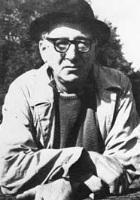Stony Grey Soil Poem by Patrick Kavanagh
Stony Grey Soil
O stony grey soil of Monaghan
The laugh from my love you thieved;
You took the gay child of my passion
And gave me your clod-conceived.
You clogged the feet of my boyhood
And I believed that my stumble
Had the poise and stride of Apollo
And his voice my thick tongued mumble.
You told me the plough was immortal!
O green-life conquering plough!
The mandril stained, your coulter blunted
In the smooth lea-field of my brow.
You sang on steaming dunghills
A song of cowards' brood,
You perfumed my clothes with weasel itch,
You fed me on swinish food
You flung a ditch on my vision
Of beauty, love and truth.
O stony grey soil of Monaghan
You burgled my bank of youth!
Lost the long hours of pleasure
All the women that love young men.
O can I stilll stroke the monster's back
Or write with unpoisoned pen.
His name in these lonely verses
Or mention the dark fields where
The first gay flight of my lyric
Got caught in a peasant's prayer.
Mullahinsa, Drummeril, Black Shanco-
Wherever I turn I see
In the stony grey soil of Monaghan
Dead loves that were born for me.
Kavanagh truly is the greatest of all Irish poets. Unlike Yeats, who romanticised the Irish peasantry to almost ridiculously patronising heights; Kavanagh, (himself a poor Irish farmer) , saw this way of life for what it really was; an unfulfilled life of struggle, poverty and frustration. His poem “Stony Grey Soil” perfectly exemplifies this way of life and gives the reader a pragmatic insight into the real life experiences of the Irish peasantry, rather than Yeats’s sentimentalised thesis, viewed from his comfortable upper-class ivory tower.
This poem has not been translated into any other language yet.
I would like to translate this poem
Not to knock Yeats but yes he did live at Thoor Ballylee in the summertime but essentially he had an urban outlook. Kavanagh was rural through and through.